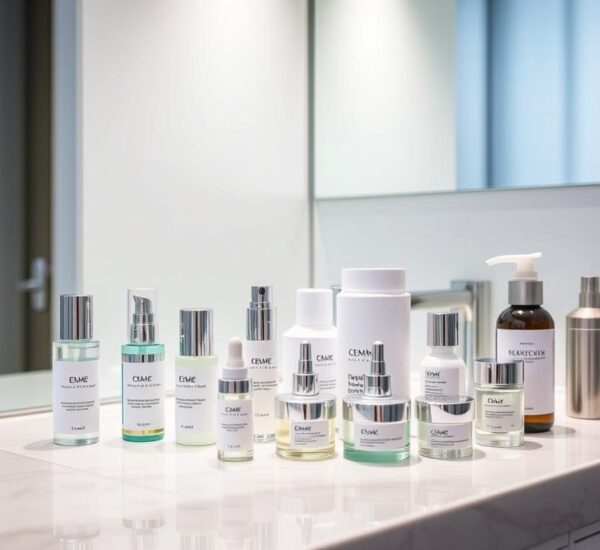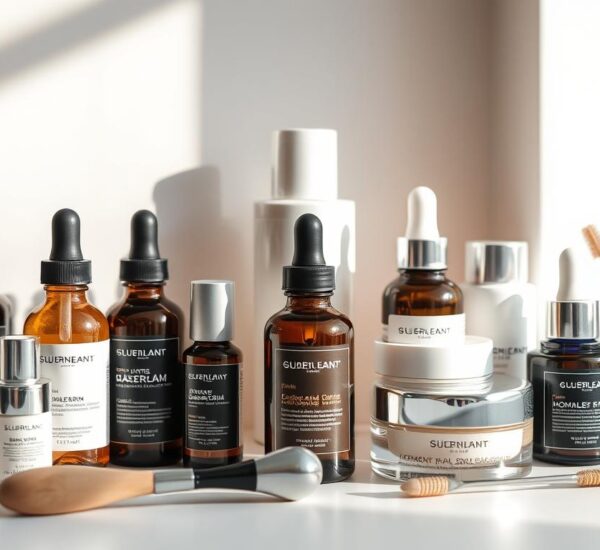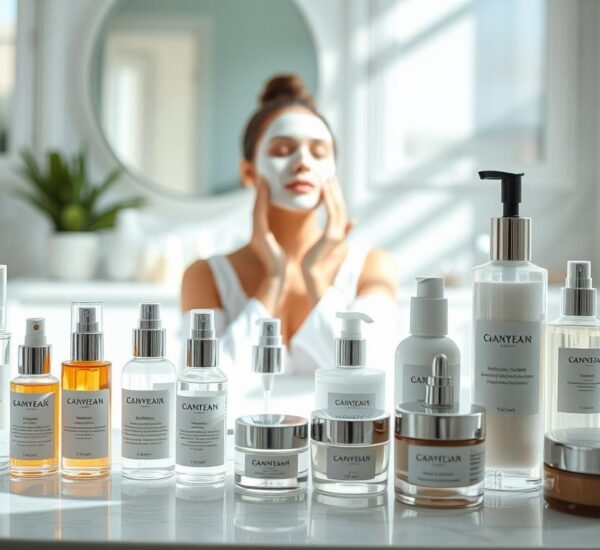Are you tired of dull, lackluster skin and yearning for a radiant complexion that glows from within?
Achieving a naturally glowing appearance is a goal for many. It requires understanding your skin type and adopting a personalized skincare routine.
We will explore the top skincare tips to help you attain a vibrant and healthy appearance. By understanding the importance of a consistent routine, the right products for your skin type, and lifestyle changes, you can unlock the secret to a radiant you.
Key Takeaways
- Understand your skin type to adopt a personalized skincare routine.
- Consistency is key to an effective skincare regimen.
- Lifestyle changes, such as diet and sun protection, play a critical role.
- Using the right products for your skin type is essential.
- A radiant complexion is a sign of overall health and vitality.
Understanding Glowing Skin and Its Importance
Glowing skin is a top beauty goal, but it’s more than looks. We all want that radiant face that shows our health and beauty.
To get this, we must know what glowing skin is and why it matters. Glowing skin has a smooth feel, even color, and shines brightly. It shows we have healthy skin.
What Is Glowing Skin?
Glowing skin isn’t just for the lucky. It comes from good skincare, a healthy life, and the right food. It’s about getting a natural glow from inside. Keeping skin hydrated, eating well, and protecting it from harm are key.
Benefits of Radiant Skin
Having radiant skin brings many benefits. Some main ones are:
- Looking better and feeling more confident
- Showing good health and happiness
- Looking younger and full of life
Knowing how important glowing skin is, we can work towards it. We can do this by sticking to a skincare routine, living healthily, and watching what we eat.
Essential Skincare Steps for a Healthy Glow
Getting healthy, glowing skin is easy with a few simple steps. A good skincare routine keeps your skin looking and feeling great. By following these steps, you can get a radiant glow that shines from the inside out.
Cleansing: The Foundation of Skincare
Cleansing is the first and most important step in skincare. It gets rid of dirt, oil, and impurities that can clog pores. Choosing a gentle cleanser that matches your skin type is key for keeping your skin balanced. Clean your face twice a day to keep it fresh and clean.
For a deeper cleanse, try a morning routine that boosts circulation, like yoga, to make your skin glow.
Exfoliation: Buffing Away Dullness
Exfoliation removes dead skin cells, revealing brighter, smoother skin. Regular exfoliation improves skin texture and reduces fine lines and wrinkles. You can choose between physical (scrubs or brushes) and chemical (alpha-hydroxy acids or beta-hydroxy acids) exfoliation. Pick what works best for your skin.
Moisturizing: Hydration Matters
Moisturizing is key after cleansing and exfoliating. It hydrates the skin, keeping it healthy and looking good. A good moisturizer soothes dryness, reduces fine lines, and makes your skin soft. There’s a moisturizer for every skin type. Look for ones with hyaluronic acid or ceramides for the best hydration.
Choosing the Right Products for Your Skin Type
Our skin is as unique as we are. It’s important to pick products that fit our skin type for skin rejuvenation. With so many options, finding the best can be tough. But knowing our skin type and what it needs helps us choose wisely for a radiant glow.
Oily Skin: Best Ingredients for a Radiant Finish
For oily skin, we need products that control oil without drying out. Look for lightweight, oil-free products marked as “non-comedogenic” or “oil-free.” Salicylic acid and glycolic acid help exfoliate and cut down oil.
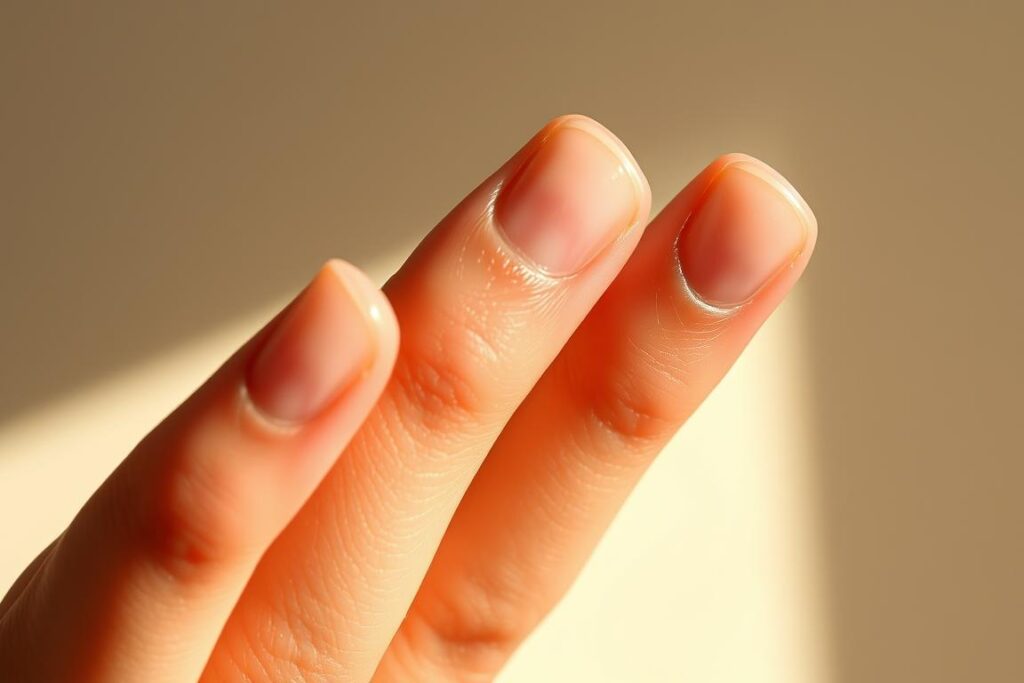
Dry Skin: Hydrating Formulas to Consider
Dry skin needs rich, hydrating formulas to keep moisture in. Hydrating ingredients like hyaluronic acid, ceramides, and glycerin repair and retain moisture. Choose creams or ointments for long-lasting hydration.
Sensitive Skin: Soothing Options
For sensitive skin, gentle and non-irritating products are key. Opt for “hypoallergenic” or “fragrance-free” products to avoid irritation. Aloe vera and green tea soothe and calm sensitive skin.
Understanding our skin type and picking the right products helps address our skin concerns. Whether oily, dry, or sensitive, there are products for a radiant finish.
The Role of Sun Protection in Skincare
Sun protection is key in our skincare routines. It keeps our skin healthy and glowing. Getting a natural glow isn’t just about the right products. It’s also about shielding our skin from harmful UV rays.
Using sunscreen every day is a simple yet powerful way to prevent sun damage. UV rays can cause early aging and even skin cancer. So, sun protection is a must in our skincare routines. By adding sunscreen to our daily care, we lower the risk of these problems.
Why Sunscreen Is a Must for Glowing Skin
Sunscreen is more than just a preventive measure. It’s a vital part of getting healthy, glowing skin. It protects our skin from UV damage. This helps keep the skin’s natural texture and tone, making it smoother and more even.
Choosing the right sunscreen is key. It should block both UVA and UVB rays and have an SPF of at least 30. This ensures our skin is well-protected against the sun’s harmful effects.
How to Choose the Right SPF
Choosing the right SPF for our skin type is important. Most people need an SPF of 30 or higher. But, those with fair skin or spend a lot of time outside might need a higher SPF.
- Consider your skin type and needs when choosing an SPF.
- Reapply sunscreen every two hours or right after swimming or sweating.
- Don’t forget to apply sunscreen to often-overlooked areas like the tops of your ears and the back of your neck.
The Importance of a Balanced Diet
Eating a balanced diet is key to having healthy, glowing skin. The food we eat gives our skin the nutrients it needs to stay healthy and bright.
To get a radiant complexion, we should eat a variety of whole foods. These include fruits, vegetables, whole grains, lean proteins, and healthy fats.
Foods That Promote Healthy Skin
Some foods are better for our skin than others. Here are some of the best ones:
- Berries rich in antioxidants
- Leafy greens packed with vitamins and minerals
- Nuts and seeds high in healthy fats
- Fatty fish rich in omega-3 fatty acids
| Food | Benefit |
|---|---|
| Berries | Rich in antioxidants, combating free radicals |
| Leafy Greens | Packed with vitamins and minerals for skin health |
| Nuts and Seeds | High in healthy fats for skin nourishment |
| Fatty Fish | Rich in omega-3 fatty acids for skin hydration |
Hydration: Drinking Water for Radiance
Drinking enough water is vital for skin hydration. Hydration helps flush out toxins and keeps our skin looking fresh and radiant.
We should drink at least eight glasses of water a day to support our skin’s health. Eating hydrating foods like watermelon and cucumbers also helps with hydration.
Incorporating Vitamins and Antioxidants
Vitamins and antioxidants are key for healthy, glowing skin. Adding them to our skincare routine boosts our skin’s natural shine. They also protect us from harm caused by the environment.
Top Vitamins for Skin Health
Some vitamins are super good for our skin. Vitamin C makes our skin brighter and helps it produce collagen. Vitamin E is another strong antioxidant that shields our skin from damage.
- Vitamin C: Enhances collagen production, brightens the complexion.
- Vitamin E: Protects against free radical damage, supports skin health.
- Vitamin A: Promotes cell turnover, reduces the appearance of fine lines.
The Power of Antioxidants in Your Routine
Antioxidants fight oxidative stress, which can cause early aging. Adding antioxidant-rich products to our routine helps fight free radicals. This leads to skin rejuvenation.
| Antioxidant | Benefits | Sources |
|---|---|---|
| Vitamin C | Boosts collagen, brightens skin | Oranges, berries, leafy greens |
| Vitamin E | Protects against free radicals | Nuts, seeds, vegetable oils |
| Polyphenols | Reduces inflammation, anti-aging | Green tea, dark chocolate, fruits |
For a natural way to add antioxidants, try a homemade rosehip oil serum. It’s packed with antioxidants and easy to make with kitchen ingredients. Find out more here.
The Impact of Sleep on Your Skin
Sleep is often overlooked in our beauty routine, but it has a big impact on our skin’s health and look. During sleep, our skin renews and repairs itself. This renewal is key for healthy skin, as it regenerates and rejuvenates.
Not getting enough sleep can make our skin look dull, puffy, and more prone to acne and dark circles. Lack of sleep messes with our body’s natural balance, making it hard for the skin to repair itself.
How Sleep Affects Skin Renewal
Sleep impacts skin renewal in several ways. During deep sleep, our body boosts blood flow to the skin, nourishing and repairing it. This process is vital for skin health and keeping it vibrant.
Also, sleep helps control hormones that affect the skin. For example, cortisol, a stress hormone that can cause inflammation and skin problems, is regulated during sleep. So, getting enough sleep is key for maintaining a balanced beauty routine that supports healthy skin.
Tips for Better Sleep Quality
To improve sleep quality and skin health, follow a few simple tips. A consistent sleep schedule is essential, as it helps regulate our body’s internal clock.
- Create a relaxing bedtime routine to signal the body that it’s time to sleep.
- Avoid screens and electronic devices before bedtime, as the blue light they emit can interfere with sleep.
- Ensure the bedroom is cool, dark, and quiet to promote better sleep.
By following these tips and making sleep a priority in our beauty routine, we can greatly improve our skin’s health and look. Healthy skin is not just about what we apply topically, but also about our overall lifestyle, including our sleep habits.
Stress Management for Better Skin
Stress can really hurt our skin’s health, making it key to manage stress for a glowing look. When we’re stressed, our body makes cortisol, a hormone that can cause skin problems. By knowing this and using stress management, we can get healthier skin and a natural glow.
Stress and Its Impact on Skin
Long-term stress can make skin issues like acne, eczema, and psoriasis worse. This is because stress causes inflammation and makes more cortisol, leading to more oil and sensitive skin.
Common skin issues associated with stress include:
- Acne breakouts
- Eczema flare-ups
- Psoriasis outbreaks
- Increased skin sensitivity
Effective Stress Management Techniques
Adding stress management to our daily life can really help our skin. Techniques like meditation, yoga, and deep breathing can lower stress.
Some effective methods include:
- Meditation: Regular meditation can lower cortisol and relax us.
- Yoga: Yoga mixes physical poses, breathing, and meditation to reduce stress.
- Deep Breathing Exercises: Simple yet powerful, deep breathing calms the mind and body.
Here’s a comparison of different stress management techniques:
| Technique | Benefits | Frequency |
|---|---|---|
| Meditation | Reduces cortisol, promotes relaxation | Daily, 10-15 minutes |
| Yoga | Combines physical postures, breathing, and meditation | 3-4 times a week, 30-60 minutes |
| Deep Breathing | Calms the mind and body | Daily, 5-10 minutes |
By managing stress well, we can make our skin healthier and look more radiant. Adding these techniques to our daily life can lead to glowing, healthier skin.
Natural Remedies for Glowing Skin
The way to radiant skin is often simple. Using natural ingredients in your skincare routine can make your skin healthier and glow.
DIY Face Masks and Treatments
Making your own face masks at home is fun and works well. Honey, avocado, and oatmeal are great for your skin. For example, a honey mask deeply hydrates. Turmeric can also lessen acne scars and brighten your skin.
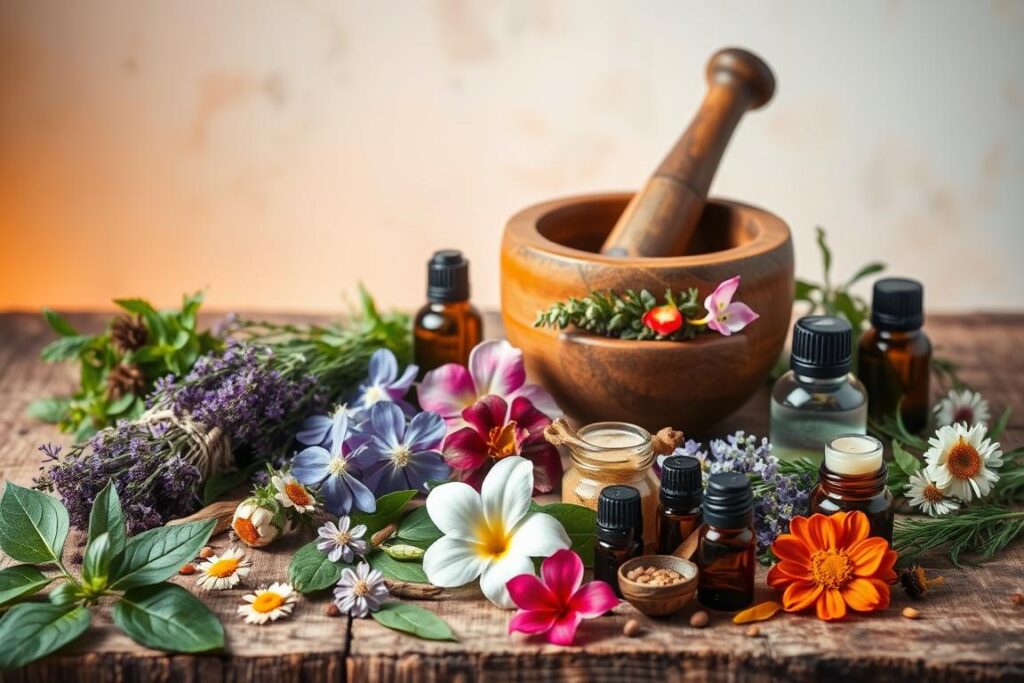
Ingredients to Try from Your Kitchen
Your kitchen has many natural ingredients for better skincare. Try using:
- Cucumber for its cooling and hydrating effects
- Lemon juice for its astringent properties
- Oatmeal for soothing irritated skin
These items can be mixed into face masks, scrubs, or used as toners. They help you get a radiant complexion.
Using these natural remedies can help you get the glowing skin you want.
Building a Consistent Skincare Routine
Consistency is key to a good skincare routine. We must find a routine that fits our skin type and stick to it. This way, we can keep our skin glowing with a well-thought-out beauty plan.
Creating a Personal Skincare Schedule
To make a skincare schedule, first figure out your skin type and what you want to fix. Then, pick products that meet your needs. Make sure to cleanse, moisturize, and protect your skin well. Following your routine every morning and night will help your skin glow.
Adjusting for Seasonal Changes
Our skin’s needs change with the seasons. In winter, we might need a richer moisturizer. In summer, a lighter, oil-free one is better. Being flexible and changing our routine with the seasons keeps our skin healthy and glowing all year.
By sticking to a consistent skincare routine and making seasonal changes, we can have radiant, healthy-looking skin. This approach is essential for our beauty routine, helping us get the glowing skin we want.
## FAQ
### Q: What are the essential steps for achieving glowing skin?
A: To get glowing skin, start with the basics. Cleanse, exfoliate, and moisturize daily. These steps improve skin health and give you a radiant look.
### Q: How do I choose the right skincare products for my skin type?
A: Picking the right skincare can be tough. For oily skin, choose lightweight, oil-free products. Dry skin needs rich, hydrating formulas. Sensitive skin requires gentle, soothing products.
### Q: Why is sun protection important for healthy, glowing skin?
A: Sun protection is key for healthy skin. Sunscreen prevents UV damage, which can cause aging and cancer. Use sunscreen every day, even on cloudy days, to keep your skin glowing.
### Q: How does diet impact our skin’s health and radiance?
A: A balanced diet is vital for glowing skin. Eat lots of fruits, veggies, and healthy fats. Drinking water also helps keep your skin hydrated and radiant.
### Q: What role do vitamins and antioxidants play in achieving glowing skin?
A: Vitamins and antioxidants are important for skin health. Vitamins C and E protect the skin and boost collagen. This keeps your skin healthy and glowing.
### Q: How can we manage stress to promote skin health?
A: Stress can harm your skin. Manage stress with meditation, yoga, or deep breathing. This can help prevent skin issues like acne and promote a radiant look.
### Q: Are natural remedies effective for achieving glowing skin?
A: Natural remedies can enhance your skincare routine. DIY face masks with honey, avocado, and oatmeal provide hydration and nourishment. They help keep your skin healthy and radiant.
### Q: Why is consistency important in a skincare routine?
A: Consistency is key in skincare. Stick to a routine to maintain glowing skin. But, adjust your routine with the seasons to keep your skin healthy all year.

